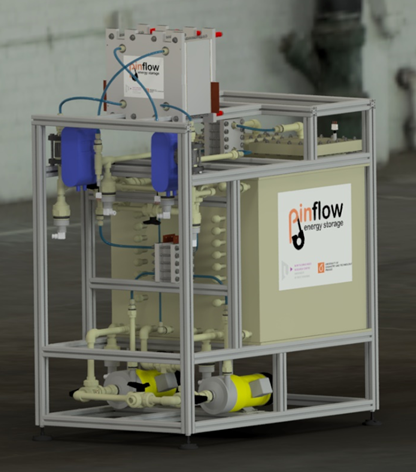Laboratory of Energy Storage
The ongoing transformation of traditional concepts in transportation and energy towards more environmentally friendly and socially responsible schemes comes along with the urgent need for reliable, efficient, cheap and safe energy storage technologies. KosekGroup is engaged in the research and development of promising electrochemical energy storage technologies such as:
- Vanadium redox flow batteries.
- Organic-based redox flow batteries.
- Zinc-air flow batteries and fuel cells.
In particular, our research focuses on the study and description of processes taking place in aqueous redox flow batteries, based on inorganic redox electroactive species (mainly all-vanadium chemistry). Individual factors influencing the efficiency, cost and durability of storage technologies are studied both experimentally and theoretically. The main research directions are following: study of electrode reactions kinetics and electro-catalysis [1], [2], [3], [4]; experimental and mathematical description of transport properties of ion-exchange and porous membranes [5], [6], [7]; development of composite conductive plates for batteries [8]; optimisation of battery cell and stack geometry with respect to ohmic and hydraulic losses [9]; experimental and mathematical description of losses caused by shunt currents and battery performance simulations [10].
Another research direction focuses on R&D of alternative electroactive substances for flow battery electrolytes based on organic redox compounds, which may significantly improve the technical and economical parameters of existing technologies [11], [12]. This is enabled due to intersectional collaboration with University of Pardubice and Centre of Organic Chemistry, Ltd., which is realized within European Regional development Fund-Project "Organic redox couple-based batteries for energetics of traditional and renewable resources (ORGBAT)" No.CZ.02.1.01/0.0/0.0/16_025/0007445. Within the project we investigate the relation between moleculare structure and functionalization and the properties relevant for the application in the battery on a large set of original molecules. [13], [14] For the perspective compounds, the electrochemical stability, electrolyte optimization and flow battery development is undertaken. [15] No.CZ.02.1.01/0.0/0.0/16_025/0007445.
Besides standard RFB, our research group focuses also on the development of hybrid flow batteries with oxygen positive electrode such as zinc-air flow batteries which is realized within TK02030001 project funded by Technological Agency of Czech Republic. Within the project we aim on the optimization of zinc metal deposition [16] playing a role during charging, study of battery electrolytes, development of novel cell designs and simulation of cell performance and lifetime. The development of efficient and stable electrodes for oxygen reduction and evolution positive electrode reactions proceeds in collaboration with Department of Inorganic Technology (UCTP) and HiLASE (Institute of Physics CAS, Dolní Břežany). The use of inorganic and organic-based negative electrolytes within the concept of X-air flow batteries is also investigated. [17], [18]
With concern to a thermodynamically consistent modelling, we were part of an international research network focused on zinc-air flow battery systems, which is formed within European Union's Marie-Sklodowska-Curie programme “European Training Network to improve materials for high-performance, low-cost next- generation redox-flow batteries (FlowCamp)”. [19], [20]
References:
[1] Mazúr, P., et al., Performance evaluation of thermally treated graphite felt electrodes for vanadium redox flow battery and their four-point single cell characterization. Journal of Power Sources, 2018. 380: p. 105-114.
[2] Mazur, P., et al., A complex four-point method for the evaluation of ohmic and faradaic losses within a redox flow battery single-cell. MethodsX, 2019.
[3] Mazur, P., et al., Effect of graphite felt properties on the long-term durability of negative electrode in vanadium redox flow battery. Journal of Power Sources, 2019. 414: p. 354-365.
[4] Halada, Š., et al., Fast screening of carbon-based nanostructured materials as potential electrode materials for vanadium redox flow battery Electrochimica Acta, 2022. 430: p. 141043.
[5] Vrána, J., et al., Commercial perfluorosulfonic acid membranes for vanadium redox flow battery: effect of ion-exchange capacity and membrane internal structure. Journal of Membrane Science, 2018.
[6] Charvát, J., et al., The role of ion exchange membrane in vanadium oxygen fuel cell. Journal of Membrane Science, 2021. 629: p. 119271.
[7] Pavelka, M., F. Wandschneider, and P. Mazur, Thermodynamic derivation of open circuit voltage in vanadium redox flow batteries. Journal of Power Sources, 2015. 293(0): p. 400-408.
[8] J. Křivčík, P.M., Z. Černá, Preparation of conductive composites based on thermoplastic binder, graphite and carbon black. WASTE FORUM 2017, 2017. 4: p. 328-333.
[9] Charvát, J., et al., Performance enhancement of vanadium redox flow battery by optimized electrode compression and operational conditions. Journal of Energy Storage, 2020. 30: p. 101468.
[10] Zugschwert, C., et al., The Effect of Input Parameter Variation on the Accuracy of a Vanadium Redox Flow Battery Simulation Model. Batteries, 2021. 7 p.7.
[11] Sánchez-Díez, E., et al., Redox flow batteries: Status and perspective towards sustainable stationary energy storage. Journal of Power Sources, 2021. 481: p. 228804.
[12] Fischer, P., P. Mazúr, and J. Krakowiak, Family Tree for Aqueous Organic Redox Couples for Redox Flow Battery Electrolytes: A Conceptual Review. Molecules, 2022. 27(2): p. 560.
[13] Burešová, Z., et al., Redox Property Tuning in Bipyridinium Salts. Frontiers in Chemistry, 2021. 8(1289).
[14] Rak, K., et al., Electrochemical investigation of structurally varied azinium scaffolds. Organic & Biomolecular Chemistry, 2021. 19(40): p. 8830-8839.
[15] Mazúr, P., et al., Evaluation of Electrochemical Stability of Sulfonated Anthraquinone-Based Acidic Electrolyte for Redox Flow Battery Application. Molecules, 2021. 26(9): p. 2484.
[16] Dundálek, J., et al., Zinc electrodeposition from flowing alkaline zincate solutions: Role of hydrogen evolution reaction. Journal of Power Sources, 2017. 372: p. 221-226.
[17] Charvát, J., et al., The role of ion exchange membrane in vanadium oxygen fuel cell. Journal of Membrane Science, 2021: p. 119271.
[18] Charvát, J., et al., New organic-air flow fuel cell and electrolyser for stationary energy storage. Journal of Power Sources, 2022. 520: p. 230811.
[19] Choi, N.H., et al., Use of Carbon Additives towards Rechargeable Zinc Slurry Air Flow Batteries. Energies, 2020. 13(17): p. 4482.
[20] Olmo, D.d., M. Pavelka, and J. Kosek, Open-Circuit Voltage Comes from Non-Equilibrium Thermodynamics. Journal of Non-Equilibrium Thermodynamics, 2021. 46(1): p. 91-108.



